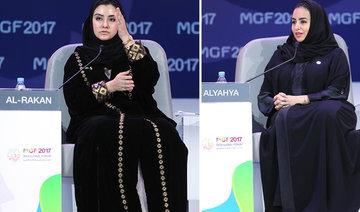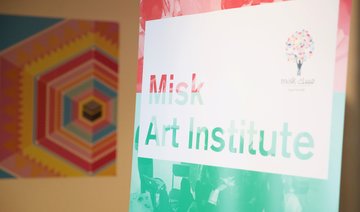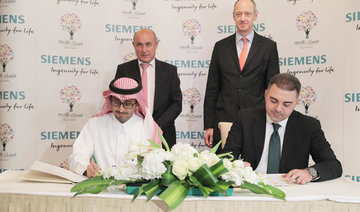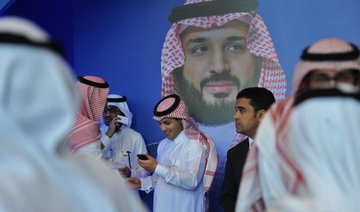RIYADH: While some see artificial intelligence as a leap to the next developmental stage for humankind, many people are worried about jobs, said Riad Hamade, executive editor for the Middle East and Africa, Bloomberg News.
The young generation now wonders what type of jobs they should be looking for, especially after talk of smart cities powered by robots became so relevant.
“Robotics and artificial intelligence have different meanings to different people,” said Esther Baldwin, artificial intelligence strategist for Intel.
She argued that artificial intelligence is “nothing new,” and that people have had degrees in this topic since the 1980s.
Baldwin was speaking on the first day of the MiSK Global Forum, which brings young leaders, creators and thinkers together with established innovators to explore ways to meet challenges of change.
“It’s only in recent research breakthroughs that have made more natural language processing possible, but robots seem to be a topic that engenders more fear that they will take people’s jobs away or they may be dangerous,” she said, adding that it is important to define what a robot is.
Baldwin, who has spent over 25 years at Intel, pointed out that robots can be anything from very small automated devices, all the way up to something that is much more sophisticated.
Addressing autonomous vehicles, Baldwin asked whether they can be counted as robots with humans inside them. “A human is now inside the autonomous vehicle and it is driving the person around. So, is that a robot?”
Seeing a robot walking around any time soon is still very unlikely, said William Tunstall-Pedoe, artificial intelligence entrepreneur formerly with Amazon Alexa.
With autonomous driving, said Tunstall-Pedoe, artificial intelligence does have an impact on jobs. “Autonomous cars are replacing the jobs of millions of people,” he said, adding that computers have started to do things that previously only the human brain could do.
Jobs will change once robots come along, but Hamade argued that “it is not like it is the first time in human history that industries have changed. The horse and carriage was a huge industry and then it disappeared.”
According to Hamade, agricultural jobs in the US have been declining for 170 years, and manufacturing jobs peaked in 1979 and have been declining ever since. “However, service jobs have been steadily rising for a very long time. So, what is the difference this time?”
“From the first industrial revolution until today, we have been talking about augmenting humans, making it easier for them to do their jobs,” said Baldwin, adding: “If you look at labor productivity, I don’t know anybody who is working fewer hours today than they did 10 or 15 years ago. Other than France, which has designated a shorter work week for people, most people are working the same number of hours, and so it is really a shift in what we are doing.”
Tunstall-Pedoe argued that the only difference between change in the 19th century/early 20th century and now is the pace of change. “I think there is plenty of evidence that the pace of change is increasing.”
It is not necessarily clear that new jobs will replace current jobs as happened in the past, as no one knows for sure what is going to happen, said Tunstall-Pedoe, who advised the young audience attending the forum that “the remedy is to keep learning, be part of this technological change and adapt to it, and continue to learn new skills so you don’t get left behind. Stay on top of technology, apply AI (artificial intelligence)to your existing business.”
He said that senior management jobs that involve complex management of people, evolved technologies and entrepreneurship are going to be the last ones to be replaced, contrary to the simpler jobs that will be among the first to be replaced.
Involving more people in coding and programing is not the answer, according to Baldwin.
“We already seeing applications where AI is doing coding. I trained as an engineer, and if I look at the advancements over the life of my career, I used to have to do manual drafting. I don’t have to do that anymore, because of high-performance computing and simulation.”
Engineers, she said, like to solve and frame problems, which is a “crucial” trait for which humans cannot be replaced.
“There are two things critical for success: Desire and opportunity,” she said, adding that “it is very apparent that the leaders of this country are providing the youth with opportunity. The question is — do the youth have the desire? And when you match these two together, you can only be successful.”
Artificial intelligence: Leap to next development stage or job threat?
Artificial intelligence: Leap to next development stage or job threat?

How conservation efforts are helping Saudi Arabia’s northern deserts bloom

- The Kingdom’s northern deserts are flowering once again thanks to heavy rainfall and national biodiversity rehabilitation efforts
- Once endangered, Silene arabica is now thriving, benefiting from reduced grazing and natural drought-resistant adaptations
RIYADH: Following an unusually wet season, Saudi Arabia’s northern desert has erupted into a sea of wildflowers. Among the most striking sights is Silene arabica, a rare species once on the brink of extinction, now thriving thanks to a national commitment to conservation.
Part of the Caryophyllaceae family — commonly known as the “pink family” — Silene arabica is one of 3,000 species within the group, which also includes the sun-loving Dianthus and the delicate Gypsophila, better known as “baby’s-breath.”
What sets Silene arabica apart is its remarkable resilience. Unlike its thirstier relatives, this hardy desert dweller thrives in clayey soils and stores water internally, making it uniquely suited to Saudi Arabia’s arid northern border region.

Its natural range spans desert and semi-desert ecosystems stretching from North Africa to southern Iran, but this year’s extraordinary bloom has made it a poster child for Saudi Arabia’s expanding efforts to protect its native flora.
Beyond Silene arabica, countless other wild plants are enjoying a resurgence — the result not only of rainfall, but also of determined national efforts to rehabilitate and safeguard the Kingdom’s biodiversity.
One of the driving forces behind this green renaissance is the Saudi Arabia Botanical Society, co-founded by Munira Al-Hazani and Joshua van Alstine. Al-Hazani is the first woman in the world to found a national botanical society.

The organization’s goals include preserving native species, building a national botanical garden and institute and cultivating environmental awareness across the country.
“We are doing this as a service to human beings through nature,” Texas-born van Alstine told Arab News. “We are not doing this only to walk around and say, ‘we do plant research, we do plant conservation.’ We are doing this to make life better for humans.”
A longtime admirer of Saudi Arabia, van Alstine said his passion for the Kingdom’s natural environment led him to become part of its sustainable development journey.
“I really want to make the biggest impact possible,” he said. “I thought, how can I do something, really, in the service of the Kingdom, and I thought of serving Saudi Arabia’s soil and plants. I really see Saudi Arabia becoming the world’s first fully green state.”

Among the native species championed by the society is Horwoodia dicksoniae, commonly known as Saudi lavender. Yet protecting these desert-adapted plants requires an understanding of their unique survival strategies — and the fragile conditions that sustain them.
“What do plants need? Plants need carbon in their soil, they need minerals in their soil, and they also need to be in a place where water is going to be stored after it rains,” said van Alstine.

This is where the desert’s hidden geology plays a critical role. “We see native plants in a lower area, rocky areas, in the desert,” he said.
“No matter where you are in the desert, if you see native plants, there is most likely going to be rocks either under the sand or above the sand, but you will see these plants are kind of growing in areas that don’t get very much wind, in comparison to the rest of the desert … and they have some sort of shade from the rough desert conditions.”
These rocky pockets act like underground rain barrels, collecting water that can sustain plants through long dry periods. Native species like Silene arabica have evolved long, deep roots to reach these hidden reserves.
DID YOU KNOW?
• Silene arabica is typically found in areas that retain rainwater, such as valleys and clay soils.
• The native plant species flowers during the spring and after periods of heavy rainfall.
• Caryophyllaceae has 89 genera and 3,000 species found all over the world.
But resilience alone is not always enough. Over the years, Silene arabica has become increasingly scarce, in large part due to overgrazing. “That is what made them disappear. There is overgrazing,” said van Alstine.
Grazing animals, especially camels, are drawn to the flower’s grassy stems and white blooms. Their popularity among foragers has taken a toll on the population. In response, the National Center for Vegetation Cover has taken steps to limit grazing in sensitive areas, allowing native species the chance to recover.

The impact is already visible. From plains to rocky valleys, wild plants are reclaiming their place in the landscape — a transformation that is being noticed not just by scientists and conservationists but by residents and visitors alike.
Silene arabica may be one of the stars of this year’s desert bloom, but it is far from the only beneficiary. Thanks to coordinated efforts to curb destructive practices and promote responsible land stewardship, Saudi Arabia’s desert is alive once again with color and life.
And for those working to make it happen, this is just the beginning.

Silver handicrafts reflect Saudi Arabia’s cultural diversity and artistic heritage

- Young Saudi women are increasingly selecting silver accessories for weddings and national celebrations due to their distinctive and attractive appearance compared to contemporary jewelry, according to Al-Awlaki
RIYADH: Silver handicrafts continue to highlight the Kingdom of Saudi Arabia’s rich cultural diversity, reflecting elegance, luxury, and the unique artistic craftsmanship of Saudi artisans.
The craft of silver jewelry holds deep historical significance, and the designation of 2025 as the “Year of Handicrafts” has renewed interest among young women and artisans, turning traditional silverwork into a modern fashion trend.

This includes learning the skills to shape, refine, and transform silver into appealing consumer products such as anklets, bracelets, rings, and necklace sets.
Silver-crafting specialist Maher Al-Awlaki noted that silver continues to attract strong demand across the Kingdom, particularly from visitors seeking traditional pieces that reflect Saudi heritage.
Silver crafting is a prominent traditional craft practiced by both men and women, and it often overlaps with gold and copper work. However, silver remains the most widely used and visually appealing material in jewelry making.
Maher Al-Awlaki
“Silver crafting is a prominent traditional craft practiced by both men and women, and it often overlaps with gold and copper work. However, silver remains the most widely used and visually appealing material in jewelry making,” he said.
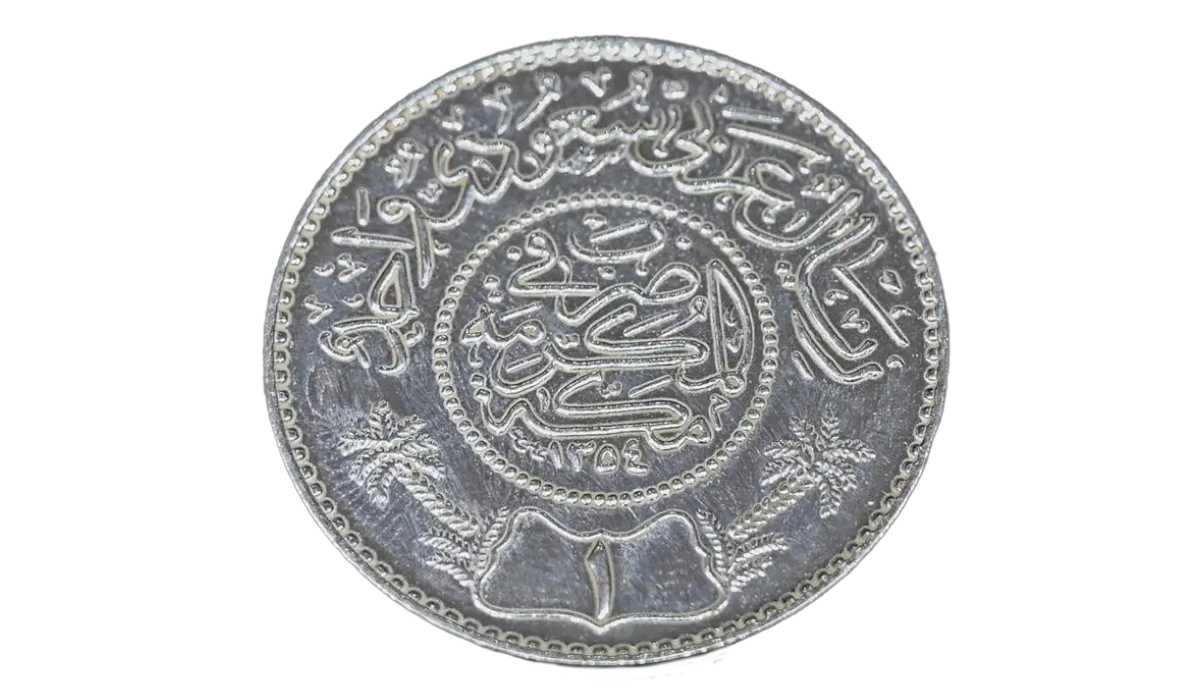
Young Saudi women are increasingly selecting silver accessories for weddings and national celebrations due to their distinctive and attractive appearance compared to contemporary jewelry, according to Al-Awlaki.
In conjunction with the “Year of Handicrafts 2025,” Al-Awlaki reports that numerous Saudi women have begun mastering silver craftsmanship through specialized training programs.

Leveraging their creativity, these artisans have successfully launched businesses to showcase their handcrafted pieces, which have been met with remarkable consumer interest.
The traditional craft has evolved with modern techniques, Al-Awlaki explained.
Artisans now employ machinery instead of manual methods, use gas flames rather than coal for soldering, and utilize prepared wax molds.
These innovations have streamlined production, allowing craftspeople to create multiple pieces efficiently while maintaining consistent sizing and design quality without the extensive time and effort previously required.
Saudi Arabia to take part in London Design Biennale

- The national Saudi pavilion tackles the water dispenser concept, which provides drinking water for free and symbolizes hospitality, a value deeply rooted in Saudi Arabia’s rich traditions
RIYADH: Saudi Arabia, represented by the Architecture and Design Commission and with the support of the Ministry of Culture, will be part of the 2025 London Design Biennale under the theme “Drinkable Water.”
The event will be held in Somerset House from June 5-29.
This year’s pavilion is handled by a team of designers who will use their expertise to present an exhibition that examines, challenges, and reimagines systems of water access and distribution, as well as the nature of our relationship with it.
The “Drinkable Water” concept, chosen by the organizers of the exhibition, is in line with the biennale’s theme for this year, which is “Surface Reflections,” as it explores how ideas are shaped through the interaction of inner experiences, external influences and personal history.
The national Saudi pavilion tackles the water dispenser concept, which provides drinking water for free and symbolizes hospitality, a value deeply rooted in Saudi Arabia’s rich traditions. These water dispensers are spread throughout the Kingdom, offering water to passersby, reflecting the ethics of generosity and kindness.
The water dispenser in the context of this exhibition does not only represent mere goodwill but also raises fundamental questions, such as: Who pays for the “free” water? How much does it really cost? And most importantly, if this burden falls on another party, won’t the cost, in one way or another, ultimately be borne by everyone?
The pavilion also stresses that water dispensers are often taken for granted and seen as mere public utilities; by reframing water as a subject of scrutiny and inquiry, we shift perceptions and uncover the unseen, turning thus these marginal structures into an active force in our daily lives.
CEO of the Architecture and Design Commission Dr. Sumaya Al-Sulaiman said: “Saudi Arabia’s return to the London Design Biennale constitutes a new promising chapter of our commitment to using design as an effective tool for dialogue and cultural exchange.”
She added: “We hope that our participation in the London Design Biennale will enable us to contribute to discussions on creativity, innovation, and systemic thinking.”
King Salman Global Academy launches Arabic equestrian glossary

- Scholars and enthusiasts can readily access precise information, while the dictionary also serves the vital purpose of cultural preservation
RIYADH: The King Salman Global Academy for Arabic Language in collaboration with the Equestrian Authority has launched an Arabic glossary of equestrian terms.
The resource targets enthusiasts and individuals interested in equestrianism and horses, aligning with the academy’s strategic goals to develop specialized glossaries that support the objectives of the Human Capability Development Program, a key component of Saudi Vision 2030.
Abdullah bin Saleh Al-Washmi, the academy's secretary-general, highlighted its role as Saudi Arabia’s primary Arabic language reference, with its glossary development efforts serving key sectors.
He said the significant cultural importance of equestrianism in the Kingdom had led to the development of the glossary, which includes terms for competitions, participation, horse descriptions, Arabian breed distinctions, colors, and ages.
The dictionary is an authoritative reference work, with a complete vocabulary of horsemanship.
Scholars and enthusiasts can readily access precise information, while the dictionary also serves the vital purpose of cultural preservation. By recording the rich terminology Arab horsemen have employed throughout history, the resource ensures that traditional equestrian knowledge and linguistic heritage will endure for generations to come, he added.
The academy’s objectives for the dictionary include bolstering academic research in Arabic linguistics and history by offering rich equestrian terminology, enhancing digital and print Arabic content with thorough horsemanship information, and establishing collaboration with the Equestrian Authority to continuously update the reference work with new definitions reflecting evolving needs in the field.
The initiative aligns with the academy’s broader mission to safeguard the integrity and identity of the Arabic language through various linguistic programs.
The organization continues to support Arabic in both spoken and written forms while facilitating Arabic language education within Saudi Arabia and internationally.
Saudi Arabia condemns Israeli closure orders for UNRWA schools in East Jerusalem

- Ministry of Foreign Affairs calls move blatant violation of international norms
RIYADH: Saudi Arabia on Friday strongly condemned Israel’s closure orders against six schools in East Jerusalem operated by the UN Relief and Works Agency for Palestine Refugees in the Near East, the Saudi Press Agency reported.
The Kingdom’s Ministry of Foreign Affairs called the move a blatant violation of international norms and a threat to humanitarian work.
The ministry said it “condemns in the strongest terms” the Israeli decision and reiterated the Kingdom’s categorical rejection of what it described as “continued intransigence and systematic targeting” of UNRWA by the Israeli occupation authorities.
The ministry also criticized what it called the international community’s silence in the face of repeated violations against the Palestinian people, warning that such silence “exacerbates the crisis and undermines the chances of achieving peace in the region.”
The UN agency said the closure orders were delivered following the forcible entry of Israeli security forces into six UNRWA-run schools, which have now been told to shut down within 30 days.
Philippe Lazzarini, UNRWA’s commissioner general, said this week that around 800 students were at risk of not completing the school year.
“These illegal closure orders come in the wake of Knesset legislation seeking to curtail UNRWA operations,” Lazzarini said, adding that the schools were protected under the privileges and immunities of the UN.



